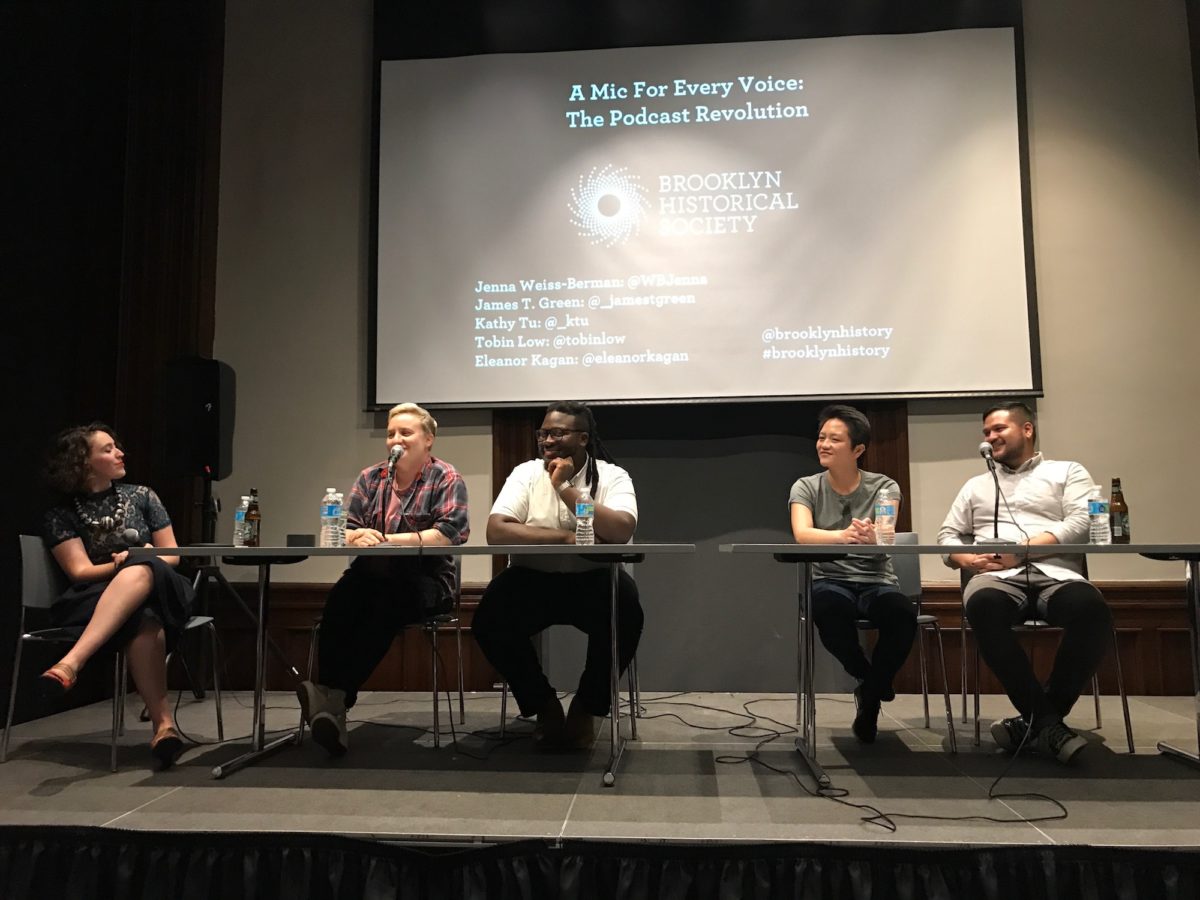“The cool thing about radio is it’s like an island of lost toys,” Tobin Low, the co-host of WNYC’s podcast Nancy, told the audience gathered at the Brooklyn Historical Society.
Indeed, as podcasting has taken off in the past few years, it’s assembled a group of personalities from quite disparate backgrounds. Low, for his part, was previously a professional cellist.
The big-tent nature of podcasting was the theme for the Brooklyn Historical Society’s panel on podcasting last Monday, entitled “A Mic for Every Voice.” The panelists included Low; Nancy co-host Kathy Tu; Jenna Weiss-Berman, the founder of Pineapple Street Media and formerly the director of audio at BuzzFeed; and James T. Green, a producer at Gimlet and cofounder of the podcast Postloudness. Eleanor Kagan, BuzzFeed’s current director of audio, moderated the panel.
The panel quickly addressed one of the aspects that complicate the big-tent narrative: as with other types of media, podcasting tends to underrepresent white women and people of color. Weiss-Berman, who previously worked in public radio, spoke of the sometimes limiting way in which the medium portrays people of color.
“There was a way that Black people were supposed to be represented,” she said. “Either they were civil rights heroes, or they were recovering drug addicts. That didn’t feel good to me.”
But if the panel itself — which was majority female, of color and LGBTQ — is any indication, that might be changing. Kagan kicked off the discussion by asking the panelists to name which podcasts made them feel included in the industry. Low name-checked BuzzFeed’s Another Round. Tu gave a shoutout to Kat Chow, one of the reporters of NPR’s Code Switch. Green noted finding This Week in Blackness after doing a Google search for “black podcasts.” And Weiss-Berman gave a nod to Low and Tu’s Nancy.
https://twitter.com/alexlaughs/status/909952407488073728
Indeed, as the evening went on, the panelists hit upon several ways in which podcasting could serve as a more inclusive pocket of both the tech and media industries for groups that haven’t necessarily been served well by either. For one, Weiss-Berman pointed out, podcasting has a relatively low barrier to entry, which makes it best positioned to address a wide variety of audiences.
“I would like to see everyone have a podcast for them,” she said.
(One caveat: monetizing all those podcasts is another story, as Nieman Lab pointed out in a five-part series on the business of podcasting last year.)
Because of its relatively low costs, podcasting has also become a means of iteration for producers in other types of media. Gimlet, for instance, has had one of its shows optioned as a sitcom for ABC. Pineapple Street Media, which is also based in Brooklyn, is similarly exploring partnerships with Hollywood studios, in which the company would split ownership of the shows it creates with the studios. (Weiss-Berman wouldn’t disclose further details.)
Much of the panel’s discussion addressed the potential — much of it untapped — for podcasting to facilitate community building. The panelists, interestingly enough, characterized their engagement with listeners as much kinder and gentler than the typical online forum. One potential reason for that: listening to a podcast requires a greater investment of time than skimming an article online or replying to a tweet. Later in the discussion, Green even lamented the paucity of critiques in the field.
“I want to see less top 10, top 20, top 50 lists of podcasts,” he said. “It feels like junk food in a way. I want to hear more criticism.”
(That said, there definitely are podcast trolls, if the Twitter feed of Code Switch‘s Gene Demby is any indication.)
Just as the critical reception of podcasting is only in its earliest stages, so is the medium’s strategy of outreach to listeners. Tu discussed the tightrope walk of working to include as many perspectives as possible while remaining true to her and Low’s interests.
Later, when an audience member asked about future innovations in the field, she pointed to the rise of “smart” speakers, such as Amazon’s Echo, which have allowed media companies to experiment with content. BuzzFeed, for instance, has a show called Reporting to You that runs on Amazon’s Alexa platform. Tu suggested that in the future, such platforms could enable podcasts to be further customized to listeners.
“We could create choose-your-own-adventure type of experiences,” she said.







